This is going to be a little different from my other reviews.
For one thing, I normally watch shows on Netflix because I want to. Today's review is about a show I watched because I needed to. There was something wrong with how I was going about it before. "It" being anything and everything you could imagine---critiquing, blogging, living. Only now do I have the missing piece.
Everyone, gather around. This...is Twin Peaks.
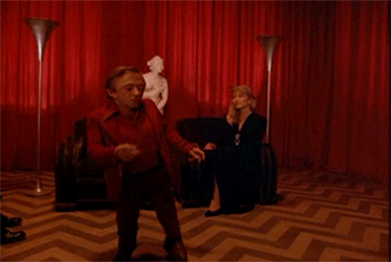
A Turning Point
You will recall, in a previous review, that I commented about how much of today's television has its roots in Cheers. It is one of those shows that has affected the entire landscape of television, possibly forever.
Twin Peaks is something bigger than Cheers. It's influence is less like an ancestral connection and more akin to something like the birth of Jesus, in that all of TV history is divided into that which came before Twin Peaks, and that which came after. And the world has never been the same since.
You may think that is an exaggeration, but the evidences for this idea are everywhere.
Follow the Signs
For my entire life, long before I ever started watching this show, I have been unable to escape it. It has wormed its way into the heart of television and become one with the source. Long before I even knew its name, I was aware that there was some grand connection hiding in all my favorite shows---a conspiracy centering on the strange symbolism found in Twin Peaks.
The signs were everywhere, in stories I had been watching my whole life, including a lot of the shows I've reviewed on Netflix.
Whether it's The Simpsons...
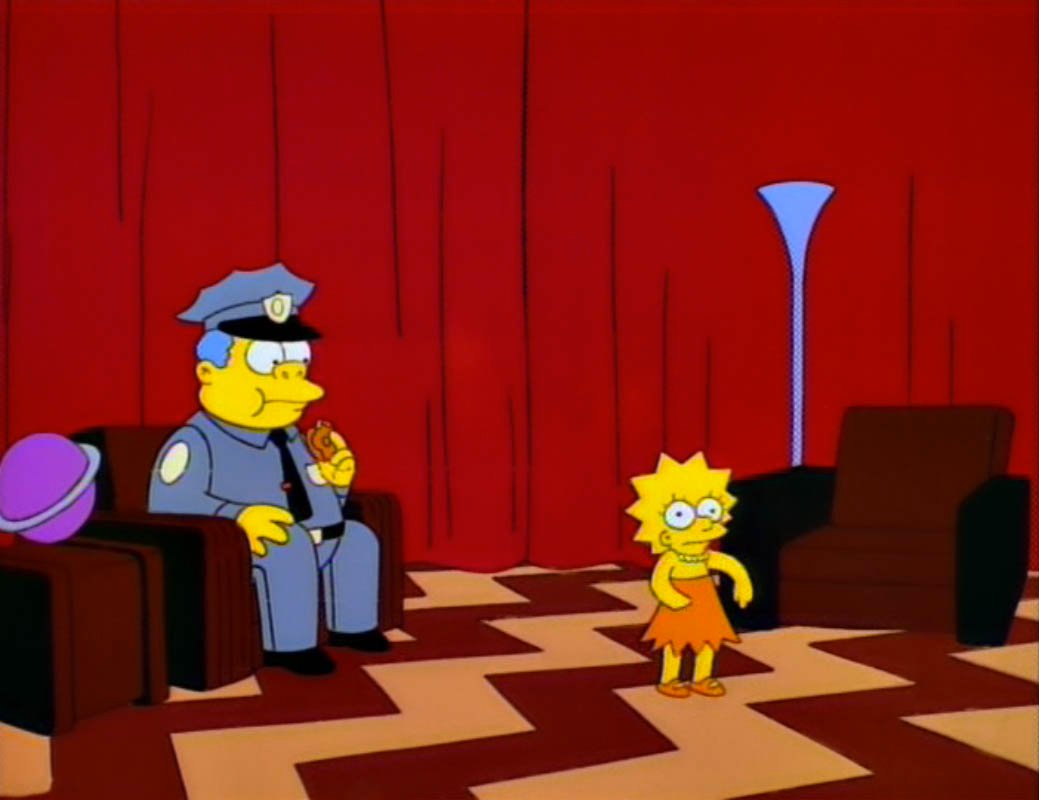
Or Scooby-Doo: Mystery Incorporated...
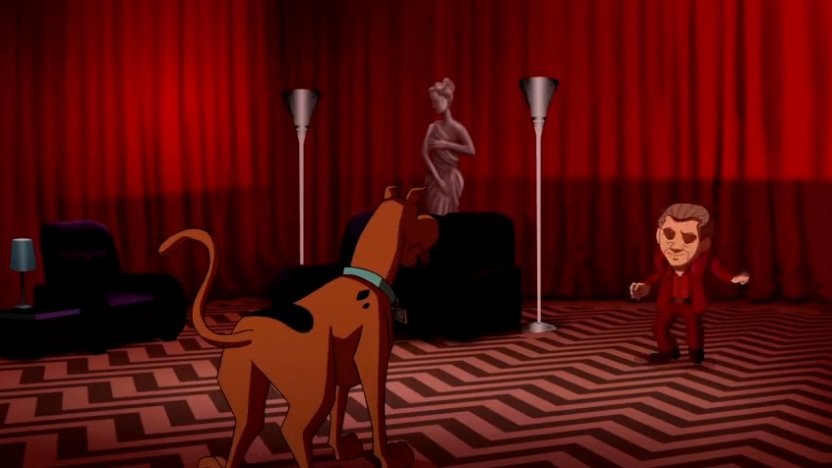
Or, even in Japan, Soul Eater...
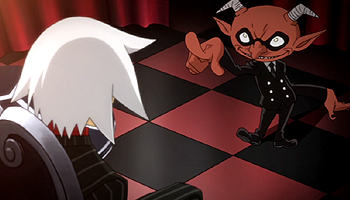
Or Regular Show...
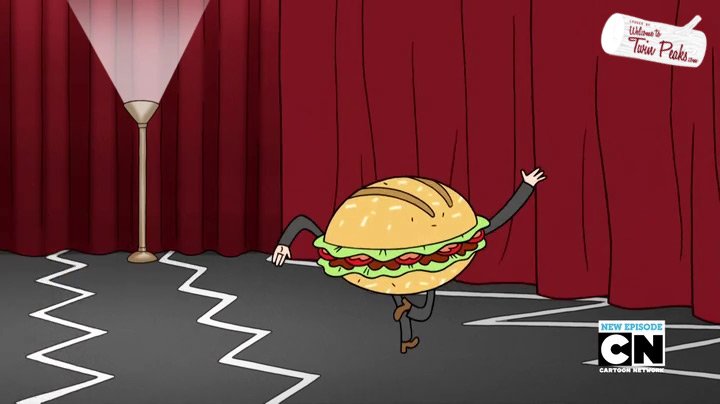
Or Gravity Falls (which has often been called an animated Twin Peaks)...
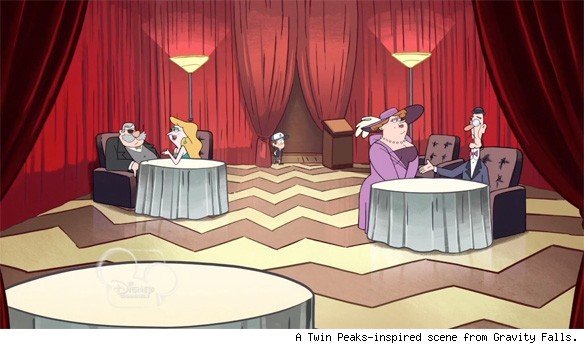
And even, on a meta level, Firefly.
It's uncanny. The shows I love are all obsessed with this one other show I have never seen. So I had to investigate. And, naturally, having investigated, I had to review.
What I found has astonished me, Diane.
The Story
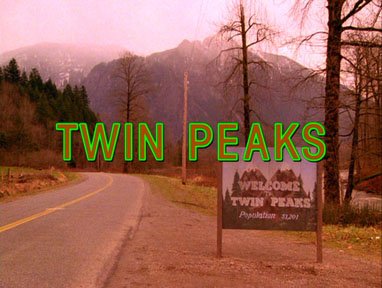
Twin Peaks takes place in a small town in the state of Washington, just five miles south of the Canadian border. With a population of 51,201, it is a little slice of Heaven in the Pacific Northwest.
But all is not well in town. A young Homecoming Queen by the name of Laura Palmer has been murdered, and someone in Twin Peaks is responsible. An FBI agent is brought in to solve the case, but that's easier said than done because everyone in Twin Peaks has horrible secrets, ranging from the stupidly obtuse to the bizarre and heinous, and the writers put absolutely no limits on what was possible for plot twists.
I would love to tell you more, but this show is best experienced with as little foreknowledge of its storylines as possible. You don't want to miss out on being weirded out the extreme, trust me.
The Characters
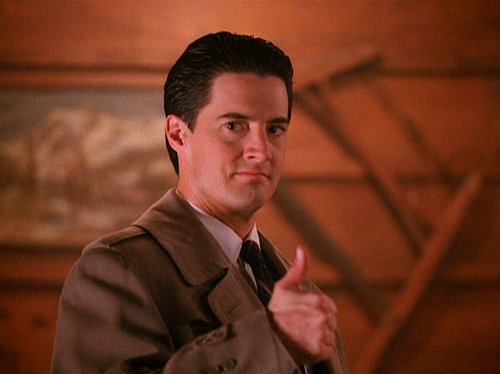
To begin with, there's agent Dale Cooper of the FBI, a young man with a few notches under his belt but still has a lot to learn. Something of a prodigy, he is strangely enthusiastic about his visit to Twin Peaks and wants more than anything to experience its laid back, rural culture and lifestyle. Played by the Kwisatz Haderach himself, Kyle MacLachlan, Agent Cooper is simply infectious.
And that's pretty much it. The other characters are mostly window dressing. Oh, there are plenty of good ones. Audrey Horne, the teenage daughter of one of the show's villains, is a perennial favorite, playing Nancy Drew with the murder case while trying to seduce older men. There's also the Log Lady, though I can't tell you anything about her without spoiling much.
And, most importantly, Audrey has a brother named John Horne, who is an imbecile. It seems he is that way in every reality.
Apart from that, you need only know two things:
- Every character is having an affair.
- Half of those affairs were with Laura Palmer.
The Quality
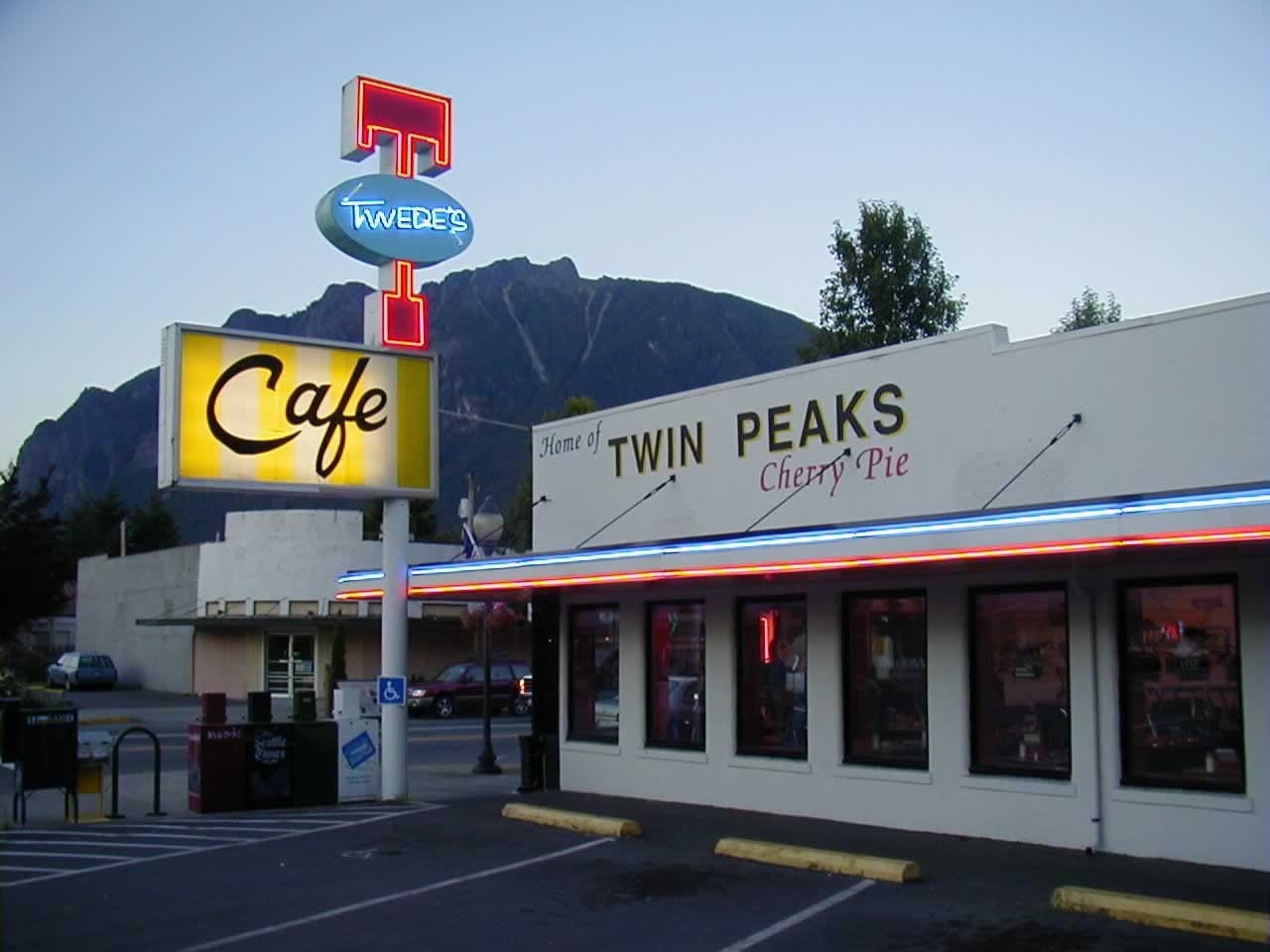
There is a reason why this series has become such a hallmark, and I will tell you what it is.
But First, a Tangent
I'm sorry for taking a detour, but it is important to understand what I am about to say, and I promise it will be relevant in the end.

In Douglas Adams's unimpeachable Hitchhiker's Guide trilogy, there is a famous quote:
There is an art to flying, or rather a knack. Its knack lies in learning to throw yourself at the ground and miss. ... Clearly, it is this second part, the missing, that presents the difficulties.You must learn how to throw yourself at the ground and miss. Pick a nice day and try it. The first part is easy. All it requires is the ability to throw yourself forward with all your weight and the willingness not to mind that it's going to hurt. That is, it's going to hurt if you fail to miss the ground. If you are really trying properly, the likelyhood is that you will fail to miss the ground fairly hard.
One problem is that you have to miss the ground accidentally. It's no good deliberately intending to miss the ground because you won't. You have to have your attention suddenly distracted by something else then you're halfway there, so that you are no longer thinking about falling, or about the ground, or about how much it's going to hurt if you fail to miss it.
It is notoriously difficult to prise your attention away from these three things during the split second you have at your disposal. Hence most people's failure, and their eventual disillusionment with this exhilarating and spectacular sport.
If, however, you are lucky enough to have your attention momentarily distracted at the crucial moment by, say, a gorgeous pair of legs (tentacles, pseudopodia, according to phyllum and/or personal inclination), or a bomb going off in your vicinity, or by suddenly spotting an extremely rare species of beetle crawling along a nearby twig, then in your astonishment you will miss the ground completely and remain bobbing just a few inches above the ground in what might seem to be a slightly foolish manner.
This is the moment for superb and delicate concentration.
Bob and float. Float and bob.
Ignore all considerations of your own weight and simply let yourself waft higher.
Do not listen to what anybody says to you at this point because they are unlikely to say anything helpful.
They are most likely to say something along the lines of "Good God, man, you can't possibly be flying!" It is vitally important not to believe them or they will suddenly be right.
Waft higher and higher. Try a few swoops, gentle ones at first, then drift above the treetops, breathing regularly.
DO NOT WAVE AT ANYBODY.
One of the later plot devices in the book series is how the main protagonist, Arthur Dent, learns how to fly using this exact method.
That was a fun quote, wasn't it. Now back to the review.
The Quality
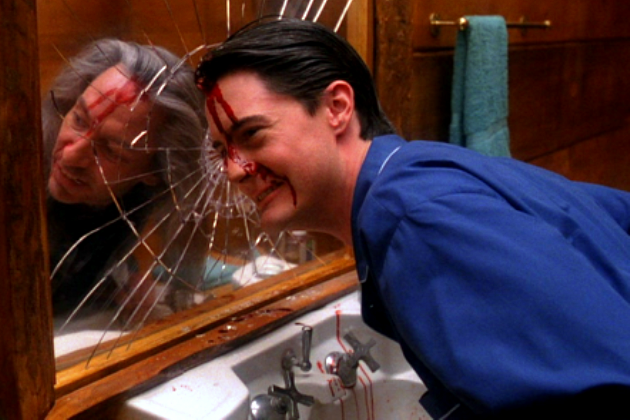
Twin Peaks has a way of staying with the people who watch it, but whatever quality it has often falls into the category of je nais se quoi, leaving its viewers and fans with little ability to describe why the series has made such a big impression on them.
I've thought long and hard about this quandary, and I believe I have an answer has eluded everyone else.
So...is the Show a Failure?

Well, speaking from an entirely rational point of view, yes. Twin Peaks is a dud of a show.
The writing is confusing, putting characters in bizarre situations that make absolutely no sense.
The research is porous, with badly executed attempts at portraying real policework, high school, and small town life.
Every character is overacted until they become a parody of themselves.
The music is sparse and repetitive. For most of the series, only two themes play: the jazzy "on the prowl" theme that plays when characters are snooping around where they aren't supposed to, and Laura Palmer's theme, which plays whenever any two characters are having a romantic moment, and will often be heard several times in the same episode.
The special effects are atrocious. Even by the standards of 1990, they were poorly executed and a pain to watch.
By any objective metric, this is the worst show ever made. Hands down.
And yet...
And yet, it somehow works. Like Arthur Dent, it plummets downward, and we have every reason to believe it will be ruined by the approaching impact. And then, at the last moment, it misses the ground. In this quasi-state of impending---but never achieving---failure, the show gains a kind of invincibility. It's not quite alive, so it can't be killed. But it's not quite dead, so it can't be dismissed.
This puts us in a bind, as we are given reasons to write off the series, but it becomes impossible to do so.
Yes, it fails as a soap opera. But is it supposed to be a soap opera?
It also fails as a comedy. But is it supposed to be a comedy?
It fails as a supernatural thriller. But is it supposed to be a supernatural thriller?
It fails at symbolism. But is it supposed to be symbolic?
These questions uncover a terrible truth---that Twin Peaks does not fit, even a little, into any genre. It is nothing else besides what it is, and it cannot possibly fail at being that. As such, no amount of badness within the show itself can sink it. And the creators of this show apparently knew this, because they stacked as much badness as they could possibly manage into this show, trying to see how much punishment it could take.
Which is not to say it's one of those shows that is "so bad that it's good", because that would imply that its goodness somehow comes from all the bad in it. And that's not true. The goodness of Twin Peaks comes from how it triumphs over the bad parts, refining out of them the primal forces that make them so powerful, and then bending those powers to make something fascinating.
So...is the Show a Masterpiece?
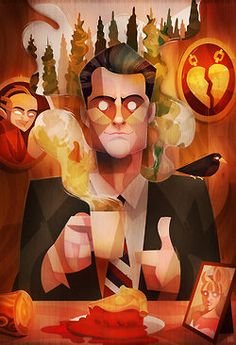
Well...
I do not doubt, that in whatever fey realm of twilight and ghosts where Twin Peaks was written and filmed, it is considered a masterpiece. But for those of us who live in this transient world of flesh and matter, we can only watch in ecstatic terror as a view of eldritch madness unfolds before us.
Watching Twin Peaks is the closest we will ever get to understanding how Salvador Dali felt when the clocks started melting. It is a transmission from the deepest parts of the universe, beyond the bounds of human comprehension.
It is not for the faint of heart.
My Judgment
I am not worthy to judge this show. It is beyond my power and my station. I will only say that there is something to all the hype and obsession people have with it, and that it must be seen in order to be grasped.
I'm not going to tell you that you have to watch it, or even that you will like it. I still don't know if I liked it. All I know is that I had to watch it, and, having watched it, I will never be the same.
All its episodes are on Netflix, with one conspicuous absence: the sequel movie, Fire Walk with Me is not currently being streamed on the platform. I have not seen it, but hear conflicting opinions, with some calling it terrible, and others saying it is a misunderstood masterpiece.
The Second Coming of Twin Peaks
With a lot of canceled shows, I like to tease, in my reviews, that there are rumors of a return. This is often the truth, because there are always rumors about old shows being revived. However, in the case of Twin Peaks, they are more than rumors.
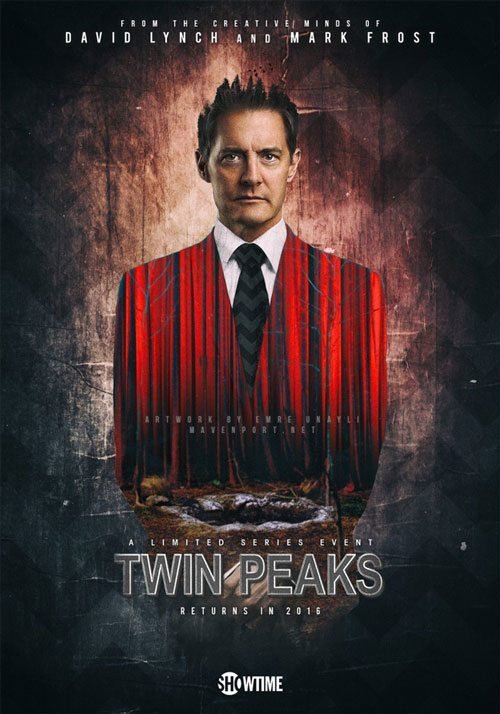
Showtime will be broadcasting season 3 in 2017, more than 25 years after the cancellation of the series. The original producers, writers, actors, and composer will be returning. I can tell you that I will be watching with intense interest, and may not even allow myself to blink.
Previous entries in the Netflixing series:
TV Shows
- The Spoils of Babylon
- Cheers
- Firefly
- Scooby-Doo: Mystery Incorporated
- Soul Eater
- The Office
- Young Justice
- Futurama
- Blue Exorcist
- Bojack Horseman
- Black Butler
- Bob's Burgers
- Sherlock
- Death Note
- Daredevil
- Attack on Titan
- 3rd Rock from the Sun
Movies
